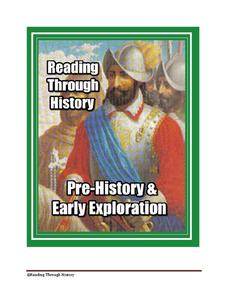Curated OER
Caught Between Worlds: Frontier Life as Reflected in Captivity Narratives
Students analyze captivity narratives written between the 1600's and 1800's. In this narrative lesson, students think critically about the interaction between Native peoples and the settlers to understand the cultural beliefs held by...
Curated OER
Early American Education and Horace Mann
Students analyze the contributions of Horace Mann. In this public education instructional activity, students research Internet and print sources regarding the history of American education, Mann.s life, the Morrill Act of 1862, and the...
Curated OER
Entrepreneurs and the African-American Dream
Students make a simple graph of labor supply and labor demand in the North and South in the early twentieth century. They conduct research to identify top contemporary African-American entrepreneurs.
Curated OER
Philanthropic Beliefs of Native Americans
Students examine the tradition of giving and sharing in early Native American communities. In this philanthropy lesson, students define the term philanthropy, list 3 traditions of Native American giving and sharing, and identify 3...
Curated OER
Orphan Trains
Learners are introduced to the concept of orphan trains. In groups, they research the history of the New York Children's Aid Society and begin to identify the social-trade offs involved on the orphan trains. They examine the geneological...
Curated OER
Three Visions for African Americans
Students consider the plight of African Americans in post-Reconstruction America. For this African American history lesson, students discover the visions of African American leaders Booker T. Washington, W. E. B. Du Bois, and Marcus...
Curated OER
Symbols of Power in Native American Clothing
Young scholars create power shirts that were highly important in the culture of many Native Americans.
Middle Tennessee State University
The Invention of the Telephone
All of the people in your class would agree that life would be different without the invention of the telephone! Study Alexander Graham Bell's most famous and influential invention through the primary source document of his...
Teaching Tolerance
Mass Incarceration as a Form of Racialized Social Control
Mass incarceration: A result of a tough stance on crime or racial discrimination, you decide. Academics explore the history and reasons behind mass incarcerations in the United States and its impact on ethnic communities. The...
Ford's Theatre
How Perspective Shapes Understanding of History
The Boston Massacre may be an iconic event in American history, but perhaps the British soldiers had another point of view. Using primary sources, including reports from Boston newspapers and secondary sources from the British...
Stanford University
Kent State
Why did a peaceful student protest end in disaster? Young historians explain the impact of the Kent State shooting. Academics analyze a photo of the Kent State shooting and explain the significance of the event by completing short answer...
Gilder Lehrman Institute of American History
Slave Narratives: Frederick Douglass, Harriet Jacobs, and the Columbian Orator
Young historians practice in-depth, quality analysis of primary source texts in this three-lesson unit, which examines excerpts from the slave narratives of Frederick Douglass, Harriet Jacobs, and Caleb...
National Park Service
The Power of Remembrance
On every July 4th, we watch fireworks and celebrate our independence, but how is the history of the American Revolution preserved? Four social studies lesson guide learners through different memorials, commemorative objects, and restored...
Core Knowledge Foundation
Thanksgiving with the Pilgrims
Teach kindergartners about the First Thanksgiving with a series of lessons about the Pilgrims' journey to the New World. As they practice handwriting, CVC words, reading comprehension, and fun Thanksgiving songs, they learn about what...
Reading Through History
Early History and Exploration Unit
We all know about Christopher Columbus, but who else explored the Americas, and specifically, the future United States of America? Learners find out these answers and more in a resource that includes four different reading sections,...
Syracuse University
Harlem Renaissance
The music and literature of the Harlem Renaissance defined American culture, including its poetry. Using a poem from the period, individuals explore its musical qualities and how it is reflective of the period. Then, they use what they...
Atlanta History Center
Civil Disobedience and the Atlanta Student Movement
What tactics are used in civil disobedience? Learners study the conditions in Alabama that led to the establishment of the Atlanta Student Movement, as well as consider the nature and effectiveness of civil disobedience.
American Battlefield Trust
Antietam 360
It was the single bloodiest day in Civil War history. Now, class members have the opportunity to walk in the footsteps of soldiers who fought in the Battle of Antietam using an interactive website. Supplemental resources include...
Stanford University
Migrant Mother Significance
What was life like for Migrant Mothers during the Great Depression? High school scholars complete a short assessment relating to primary sources.The assessment tests academics' ability to analyze primary sources by correctly...
Newspaper Association of America
Using the Newspaper to Teach the Five Freedoms of the First Amendment
Of all the amendments found in The Bill of Rights, the First Amendment contains some of the most important freedoms for American citizens. A unit plan on the First Amendment features interactive lesson plans designed to teach about those...
Midwest Clinic
Latin Rhythms: Mystery Unraveled
There is an indescrible energy to Latin American music—but if you know your music theory, it's not so indescrible after all. A thorough packet provides definitions for terms like bolero, charanga, shekere, and tumbao before listing...
City University of New York
Women's Suffrage and World War I
Democracy cannot exist where not everyone has equal rights. Discuss the state of democracy and women's suffrage during World War I with class discussions, debates, and primary source analysis, in order for class members to connect...
Union Elementary School District
Famous Dead People Project
Despite the slightly off-putting title, the instructions and activities detailed in these project guidelines for researching a noteworthy figure will serve as a fantastic supplement to your next famous person research...
City University of New York
Urban Politics: Machines and Reformers
Take a trip to the turn of the twentieth century with a resource about industrialism in America. With primary source documents and focus questions, learners think about the ways that government groups and organizations paved the way...

























